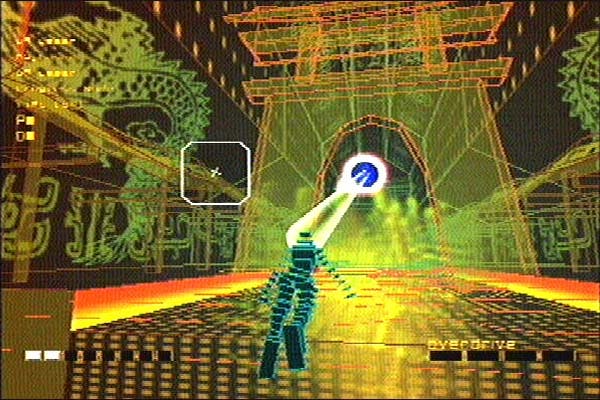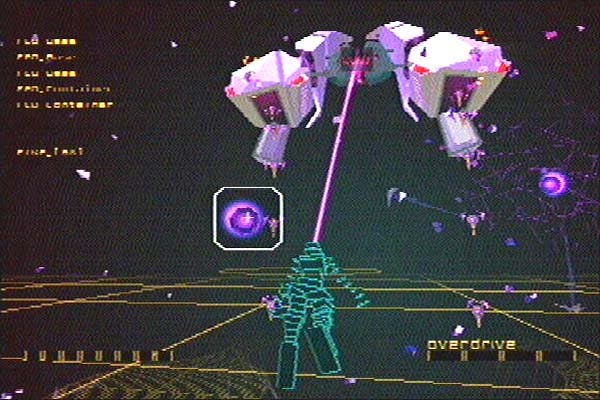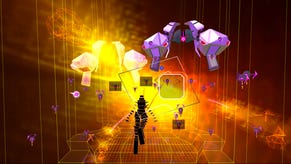Rez
Review - Musical mouse turns his attention to Sega's bizarromatic melody-buster-em-up

Insert Coin
While some would like to think of Rez as genre-breaking (or even genre-forming), it's essentially a 3D shoot 'em up. There isn't really a lot more to it than that. It's not deep; there is no elegant, unfolding narrative; there's no character development or huge locales to explore. It's just a shoot 'em up.
But "just" is such a misleading word. Because although Rez is based around a tried and tested formula, UGA have done something truly amazing with it. The action follows the story of a huge computer network under siege by viruses taking control of the whole system. The attack has forced the systems central AI, Eden, into hiding deep within the network, and it's your task to release her by trekking through the five sub-systems, shooting down viruses and breaking firewalls (bosses) until you find her.
Rez plays a lot like Sega's classic Space Harrier, with the camera watching the action and player from a third-person perspective, as he/she/it progresses through each level on a set course. You're able to rotate your character through 360 degrees on occasion to take out enemies coming at you from behind, and sometimes the game takes care of this for you as well so you're left to concentrate on the action.
Bringing down your adversaries consists of simply holding down the fire button and passing the crosshairs over them, at which point your laser is locked onto them and they're shot down as soon as you release the button. You can also rack up multiple targets before releasing the button to inflict the maximum amount of damage. Naturally as the game progresses in difficulty, some enemies take multiple hits to despatch. Now, you'd be forgiven at this point for thinking "so?", but what makes Rez so damn appealing is that it's literally an interactive work of art.

Sensory Overload
At first, your environment consists of a few red bars running underneath your floating humanoid body, itself simply made up of squares to begin with, however your character can evolve through several humanoid forms throughout your journey by collecting blue orbs dropped by ex-virii. The soundtrack is merely a slow, thumping bass drum and the experience is a sparse, empty one. As you shoot down your first couple of viruses, they emit small sounds, like a snare hit or synth stab as they explode into shards of wireframe polygons. These sounds release in time with the thumping bass, and as more enemies come at you and you get a lot handier with the targeting cursor, something resembling music begins to form.
Eventually a small cube will float into view, which contains the "password" to the next level. Shooting this down will progress your character deeper into the network, all the while your surroundings becoming more complex, forming recognisable shapes and structures around you which pulsate and deform in time with the music. By the time you reach the first boss, your speakers and screen are exploding in an orgy of sound and abstract colour which forces a smile onto your face.
The boss battles are an incredibly stressful experience, and can often be an exercise in luck more than skill. This is especially so in the later stages of the game when it chucks as many projectiles at you as possible in a bid to thoroughly confuse you - a tactic at which Rez succeeds admirably.
Once you get over how damn gorgeous Rez looks and sounds (you really have to see it moving, these shots don't even come close to doing it justice - especially when using a VGA box), there is nothing more here for you. There are extra areas to unlock, and score attack modes to play, but .. well that's it. UGA have gotten so carried away with making this a sensually immersive title that they forgot they need to justify to your average gamer why forking out £30 on a game that will take five hours to finish would be a good idea. It's worth at least renting, though, just to see whether or not you like it.
Conclusion
Rez is one of those games which shouldn't be released at full whack. The forthcoming PlayStation 2 release is even less attractive, thanks to Sony's inexplicable reluctance to permit cut-price software. When Rez eventually turns up cheaply it will become indispensable, but until then it's a luxury. Albeit an extraordinarily pretty, addictive and entertaining luxury. For people with disposable income and aspirations of class, perhaps.
Once you get it on a big TV or monitor and hook it all up to a meaty stereo system, it really is something special to behold. In an entertainment medium currently obsessed with realism, it's nice to experience a new take on game design ethics of the past that reminds us why we play videogames in the first place: for fun.




